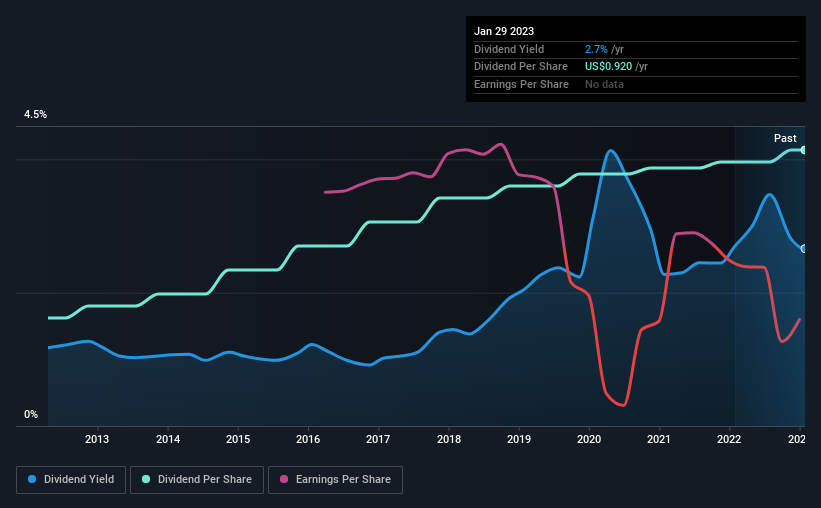Here's Why We're Wary Of Buying Matthews International's (NASDAQ:MATW) For Its Upcoming Dividend
Readers hoping to buy Matthews International Corporation (NASDAQ:MATW) for its dividend will need to make their move shortly, as the stock is about to trade ex-dividend. The ex-dividend date is usually set to be one business day before the record date which is the cut-off date on which you must be present on the company's books as a shareholder in order to receive the dividend. The ex-dividend date is an important date to be aware of as any purchase of the stock made on or after this date might mean a late settlement that doesn't show on the record date. This means that investors who purchase Matthews International's shares on or after the 3rd of February will not receive the dividend, which will be paid on the 20th of February.
The company's next dividend payment will be US$0.23 per share, on the back of last year when the company paid a total of US$0.92 to shareholders. Based on the last year's worth of payments, Matthews International stock has a trailing yield of around 2.7% on the current share price of $34.58. We love seeing companies pay a dividend, but it's also important to be sure that laying the golden eggs isn't going to kill our golden goose! We need to see whether the dividend is covered by earnings and if it's growing.
See our latest analysis for Matthews International
Dividends are usually paid out of company profits, so if a company pays out more than it earned then its dividend is usually at greater risk of being cut. Matthews International paid a dividend last year despite being unprofitable. This might be a one-off event, but it's not a sustainable state of affairs in the long run. Given that the company reported a loss last year, we now need to see if it generated enough free cash flow to fund the dividend. If cash earnings don't cover the dividend, the company would have to pay dividends out of cash in the bank, or by borrowing money, neither of which is long-term sustainable. It distributed 49% of its free cash flow as dividends, a comfortable payout level for most companies.
Click here to see the company's payout ratio, plus analyst estimates of its future dividends.
Have Earnings And Dividends Been Growing?
Companies with falling earnings are riskier for dividend shareholders. If business enters a downturn and the dividend is cut, the company could see its value fall precipitously. Matthews International was unprofitable last year and, unfortunately, the general trend suggests its earnings have been in decline over the last five years, making us wonder if the dividend is sustainable at all.
Many investors will assess a company's dividend performance by evaluating how much the dividend payments have changed over time. Matthews International has delivered 9.8% dividend growth per year on average over the past 10 years.
Remember, you can always get a snapshot of Matthews International's financial health, by checking our visualisation of its financial health, here.
Final Takeaway
From a dividend perspective, should investors buy or avoid Matthews International? First, it's not great to see the company paying a dividend despite being loss-making over the last year. On the plus side, the dividend was covered by free cash flow." It's not the most attractive proposition from a dividend perspective, and we'd probably give this one a miss for now.
With that being said, if you're still considering Matthews International as an investment, you'll find it beneficial to know what risks this stock is facing. For example, Matthews International has 2 warning signs (and 1 which doesn't sit too well with us) we think you should know about.
Generally, we wouldn't recommend just buying the first dividend stock you see. Here's a curated list of interesting stocks that are strong dividend payers.
Have feedback on this article? Concerned about the content? Get in touch with us directly. Alternatively, email editorial-team (at) simplywallst.com.
This article by Simply Wall St is general in nature. We provide commentary based on historical data and analyst forecasts only using an unbiased methodology and our articles are not intended to be financial advice. It does not constitute a recommendation to buy or sell any stock, and does not take account of your objectives, or your financial situation. We aim to bring you long-term focused analysis driven by fundamental data. Note that our analysis may not factor in the latest price-sensitive company announcements or qualitative material. Simply Wall St has no position in any stocks mentioned.
Join A Paid User Research Session
You’ll receive a US$30 Amazon Gift card for 1 hour of your time while helping us build better investing tools for the individual investors like yourself. Sign up here

 Yahoo Finance
Yahoo Finance 
